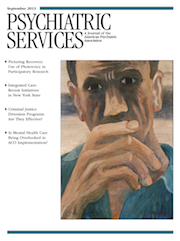To the Editor: It remains unclear whether ethnicity attenuates service engagement among psychiatric patients (
1). The relationship between ethnicity and engagement may be confounded by perceived coercion, illness insight, and severity of symptoms (
1–
4). However, previous studies of this topic have been cross-sectional (
1). Therefore, we examined the relationship between ethnicity, service engagement, perceived coercion, illness insight, and severity of symptoms among 141 involuntary committed patients during a one-year follow-up (
5).
Patients involuntarily admitted to three facilities in Rotterdam, Netherlands, between January 2005 and July 2006 were eligible (N=276), and 207 patients (118 men, 68%, and 56 women, 32%) were included (75% participation rate). Twenty-eight participants were excluded because the request for the court-ordered admission was rejected and five because of loss to follow-up. We also excluded participants who did not belong to one of three major ethnic groups, leaving a sample of 141 participants: 36 (26%) Antillean-Surinamese patients, 31 (22%) Turkish-Moroccan patients, and 74 (52%) Dutch native patients. Participants and clinicians were interviewed at baseline and after six and 12 months.
Service engagement was assessed with the Service Engagement Scale, a 14-item, clinician-rated measure consisting of statements that assess service engagement. Four subscales assess availability (“When a visit is arranged, the client is available”), collaboration (“The client actively participates in managing his or her illness”), help seeking (“The client seeks help to prevent a crisis”), and treatment adherence (“The client refuses to cooperate with treatment”). Illness insight was measured with the Schedule of Assessment of Insight–Expanded, perceived coercion with a 15-item questionnaire, and symptom severity with the 24-item version of the Brief Psychiatric Rating Scale. Erasmus University Medical Center’s Medical Ethics Committee approved the study, and all participants provided informed consent.
At baseline, patients from ethnic minority groups were younger than Dutch native patients (Antillean-Surinamese, 31.2±9.9 years; Turkish-Moroccan, 27.0±7.1; and Dutch native, 42.9±15.8 years; F=20.25, df=2 and 138, p<.001). Larger proportions of the ethnic minority groups had a psychotic disorder (Antillean-Surinamese, 92%, N=33; Turkish-Moroccan, 90%, N=28; and Dutch native, 66%, N=49; χ2=12.66, df=2, p=.002). No significant between-group differences were found in service engagement, illness insight, perceived coercion, and symptom severity. Mixed-model regression analyses showed a significant increase in engagement during follow-up (time β =−1.34, SE=.28, p<.05; time2 β=–.05, SE=.02, p<.05). Better illness insight was correlated with greater engagement (β=–.91, SE=.17, p<.05). Over the follow-up period, engagement deteriorated among patients with more severe symptoms (β=–.05, SE=.06; by time β=.02, SE=.01, p<.05) and among patients with high levels of perceived coercion, although this effect became weaker over time (perceived coercion β=.10, SE=.06; by time β=.05, SE=.02, p<.05; by time2 β=–.004, SE=.002, p<.05). No significant relationship was found between ethnicity and the course of engagement during follow-up.
This prospective study showed that ethnicity per se was not related to service engagement among involuntarily committed patients, either at baseline or during follow-up. The increase in engagement during follow-up was related to better illness insight and coincided with less perceived coercion and severity of symptoms.
Acknowledgments and disclosures
This work was supported by the Dutch national research grant organisation, ZonMW, grant number 100-002-004. The authors thank Niels Mulder for his contribution to the study and analysis.
The authors report no competing interests.

